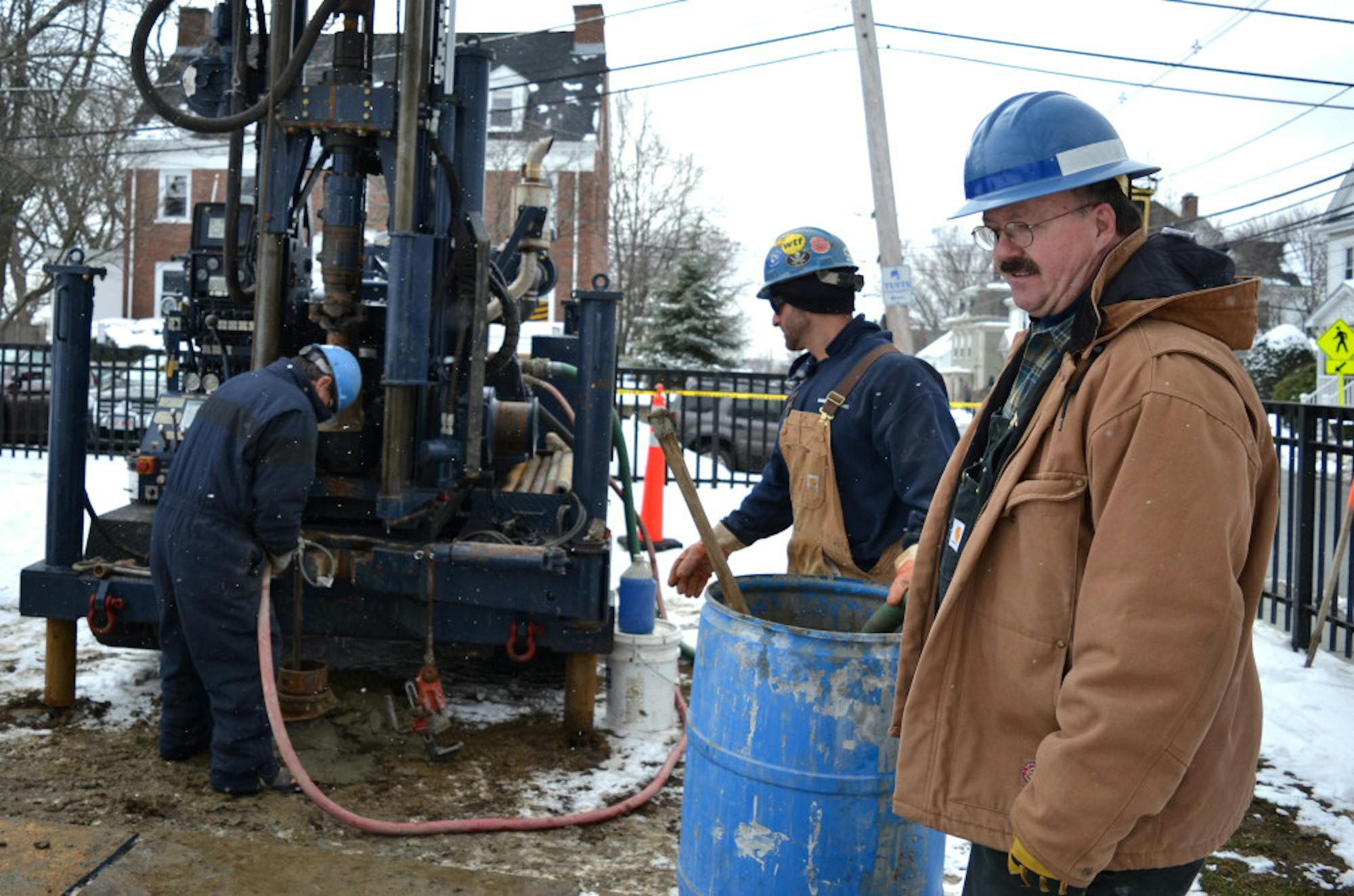It's probably accurate to say that most Jumbos don't really think about the ground beneath their feet, unless they're cursing the Hill as they trek from South to Mail Services. The Department of Earth and Ocean Sciences (EOS), however, is trying to change that.
EOS Professor Grant Garven is leading students to the world below Tufts in well-drilling projects around campus as part of his course Field Methods in Hydrogeology (EOS 133). The EOS department is hoping to discover more about the earth underneath Tufts and use that knowledge to solve a wide array of issues on campus, according to Garven.
Two weeks ago, the EOS 133 class drilled a 150-foot well outside of Lane Hall, one of many dug by Dr. Garven and his team during the spring semester. To study the foundation of the Medford/Somerville campus, his team surveys and selects an area before drilling down and sampling material from the site. Afterward, they observe and test the rocks and water, examining the composition, pressure and temperature. From there, they can determine the bedrock composition and its age, Garven said.
Garven explained that this 150-foot well and the course as a whole provides students with situations they would encounter in their careers as professional geologists.
“I'm trying to expose the students to the practical field methods we [hydrogeologists] use,” he said.
The knowledge acquired from these drillings also offers data and information about the Tufts campus and the Boston Basin, according to Garven. Practically speaking, Garven noted that the EOS department’s work can also be useful to groups and services on campus, such as facilities and groundskeeping.
That shared work inspires a certain level of cooperation between facilities, groundskeeping and the EOS department. For example, Grounds Supervisor John Vik has been heavily involved with Garven’s hydrogeology projects. Vik, who is retiring from the Tufts Facilities Department in early March after 36 years, described the relationship between his work and that of Garven’s team.
“[Garven] needs logistical support—he needs permission, he needs place to stage his equipment and he needs to notify operations of what he’s doing so we can thoroughly evaluate it as to how it will impact the campus,” Vik said.
Vik’s team provides Garven with support and oversight, but Vik also noted that he has an interest in geology himself. Since his department started authorizing and overseeing Garven’s projects five years ago, both departments have benefited from the partnership.
Vik explains that Zimman Field behind the Aidekman Arts Center is a prime example of how both departments collaborate. Garven approached Vik about the field’s 30-year-old defunct irrigation system and, after permission to test, determined that installation of a new well to irrigate the field was possible.Afterwards, Vik said, this was counted as a huge gain for sustainability at Tufts.
“Professor Garven has had a tremendous impact on sustainability on this campus and in our department in particular,” Vik said.
According to Vik, a current operations-related sustainability project between his and Garven's departments involves a well outside Lane Hall, adjacent to the previously-mentioned 150-foot well. This collaborative well is the starting point for a project that creates a heating/cooling system for the building. Garven himself is grateful for the improvements in sustainability at Tufts over the years, and aims to propel it further.
According to Garven, the drilling projects will continue throughout the rest of the semester and subsequently in future semesters. The most recent project is a drilling site on Fletcher Field at the corner of Professor's Row and Curtis Street. The team is still taking measurements, so they do not know how deep this well will be. Nevertheless, both Garven and Vik said their departments are excited to see what the future holds for well drilling projects and their positive effects on the community.
As a whole, geological sciences as a field of study are often ignored by potential students, according to Shoshana Weiner, a senior majoring in geological sciences and French. Weiner also described her passion for geology and fieldwork. Instead of Garven's Field Hydrogeology, Weiner took a course on Groundwater Hydrology this past semester, in which drilling was also involved.
“[The fieldwork project] is not only cool because we get to apply what we learn in class…but also because all of the data we collected and all the analyses we did through that project are really helpful in understanding the geology of Tufts and Medford/Somerville community,” she said.
Weiner added that the fieldwork has helped her with her class problem sets and in learning to appreciate geology. Furthermore, it has also helped her gain hands-on experience that will be useful after graduation. Partly due to her fieldwork courses, Weiner reported a particular interest in museum, aquarium and general geological sciences education and wants to help implement geology education in classrooms.
“Geology is around us," Weiner said. "You have to go outside and see it for yourself in order to understand everything, so the hands-on experience is very crucial to connecting material you learn in the classroom to what it actually means."
Department of Earth and Ocean Sciences explores ground below Tufts

Tufts Civil and Environmental Engineering Professor Grant Garven works with a local drilling company to construct an observation well on Fletcher Field on Feb. 10.





